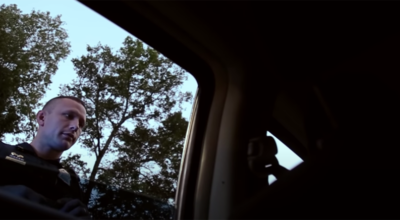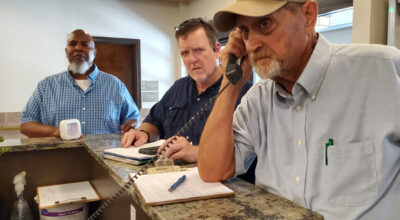


NASHVILLE, Tenn., Monday, July 31, 2023 – Arthur J. Hirsch today files an emergency petition with the Tennessee supreme court, and joins me in walking to attorney general Jonathan Skrmetti’s office on the other side of the capitol building to serve him a demand letter.
By David Tulis / NoogaRadio Network
Mr. Hirsch is an independent businessman from Lawrence County who has been under prosecution six years ending in conviction for “driving on suspended.” He says the F$550 litigation tax demanded of him is “facially UNCONSTITUTIONAL” and is a “justice for sale or pay to play scheme contrary to the rule of law” he cannot pay before an Aug. 8, 2023, deadline set by court of appeals to receive payment or have his appeal denied a hearing. The constitution requires the courts be open and “right and justice administered without sale, denial or delay” Tenn. const. Art. 1, 17.
This reporter’s letter to Mr. Skrmetti asks for his assistance in halting a sequence of abuses starting with a misapplication of the financial responsibility act upon the entirety of the motoring population in the state. I am calling out revenue commissioner David Gerregano for fraudulently applying chapter 12 of Tenn. Code Ann. Title 55, on motor vehicles, the state trucking law, promiscuously upon all drivers.
The law is enforced as if Tennessee were an “mandatory insurance” state when it is not. Tennessee is an “after-crash” state that requires proof of financial responsibility for parties involved in a qualifying roadway accident. Auto insurance is one possible proof among four, and entering an insurance contract can be compelled upon a driver who fails to obey the 20-day requirement of reporting to the commissioner of safety about the crash. No law in Tennessee compels anyone on the road in car or truck to obtain insurance, unless he is a motor carrier.
As I point out to the AG, however, the law in Tennessee is rendered incoherent and self-defeating because of the primary harm and fraud distilled in Tennessee transportation administrative notice. In brief, the motor vehicle laws apply only to motor carriers, and to defraud the people the state pretends no one can use the roads by right for private pleasure or private necessities, but all must use the road commercially, under the trucking law regulating transportation. In other words, the state forces Gran’ma and the soccer mom with children in the minivan heading to swim practice and a soccer match into becoming carriers. This fraud is tolerable for most people, and has avoided a revolution, because the commissioner of safety, Jeff Long, refuses to collect a F$50 per year carrier permit most people are required to pay – yes, even Gran’ma. I point out that Mr. Long is refusing my check for F$50 to get the permit
Our group enters the heavy doors of the supreme court building, greets two troopers at the left behind a desk, and steps up to the clerk’s desk opposite the front doors. Clerk Lisa Marsh and a colleague greet us and deal with Mr. Hirsch’s concerns about immediate filing.
Our group includes
➤ Michael James, a truck driver who fought with own wits a bogus double-felony assault charge with a court filing voiding the prosecution in Hamilton County general sessions court. His case against Chattanooga “rogue cop” and perjurer Lance Hughes (now on the highway patrol payroll) and the city sits in Cincinnati in the court of appeals in the notorious “911 call from hell” story.
➤ Christopher Sapp, NoogaRadio Network midstate bureau chief, a reform activist involved in our coverage of the Tennessee judicial conference kept secret in violation of Tennessee’s open meetings act, the 1st amendment to the U.S. constitution and the state constitution’s press protections in the bill of rights. Mr. Sapp backs the right of petition and remonstrance, and defends free markets and liberty in White County, between Chattanooga and Nashville. Mr. Sapp is a man of extraordinary knowledge of Tennessee law and interested in its proper use under God.
Mr. Hirsch, 74, insists the F$550 litigation privilege tax is illegal because it is applicable only on parties exercising the law privilege or franchise – namely lawyers and attorneys. Mr. Hirsch is not an attorney and is appealing a criminal case by right on his own, pro se, for himself, in his persona propria.
Civil cases in Tennessee are appealable by right only through the court of appeals. Criminal cases are appealable by right through the supreme court. Attorneys are taxed a privilege tax because they are a state-owned occupation conducting business in courts – the people’s property.
Privilege is a progressive grossierte in Tennessee as it implies discrimination and classification in society, and state ownership of many lines of occupation or calling. The case against Mr. Hirsch is a privilege enforcement case. The state through a state trooper witness accuses him of exercising a state privilege (driving) that is “suspended.” The AG office’s Janet Kleinfelter documents for Mr. Hirsch no record exists of any license or application is no record either of license or suspension. Tennessee officials, apart from law, create policies, including one that allows prosecution of people for “suspended license” decades after any license has expired.
The Hirsch case is a privilege dispute.The court tax is illegal because it is imposed on pro se litigants outside of any privilege.
Mr. Hirsch lives a subsistence life and has no money with which to pay. He withdrew an application to file in pauperis after the Lawrence County court system asked the court of appeals clerk to remand that petition back to the county so it could hold a hearing on it, and seek to trip and ruin Mr. Hirsch by deep inspection of his private property and assets.
Mr. Hirsch cites more than a dozen authorities for his claim of being tax immune, and insists the F$550 amount is arbitrary, capricious, opaque and needless, as the court system is funded by general taxation and cannot be allowed to burden the rights of the poor making petition.
The claim is vital to me, as my legal reform labors are in persona propria, in my own person, and increasingly under claims of poverty. My last two appellate court filings were under in forma pauperis, affidavit of indigency.
Mrs. Marsh tells Mr. Hirsch that the copies he submits go instantly to the court, and that the filing is accepted.
Not inherently dangerous
My new case vs. revenue commissioner David Gerregano starts at his enforcement of the financial responsibility law against me without any facts in hand that I’ve had a wreck. My letter to Mr. Skremetti intends to inform him of this development and empower him to begin corrective action pursuant to the law, as his prosecution of wrongdoing will be more effective than mine.
The fraud by the state is that the trucking law at Title 55 applies to all users of the road, apart from consideration of privilege, even though use of cars is not considered dangerous. One case says a car is a dangerous instrumentality in hands of a careful personal, and lethal in the hands of a drunk. But court cases say it is well settled that an automobile is not in law an inherently dangerous instrumentality and drivers must use no more than ordinary care in using them.
Truckers use the roads under privilege because the roads belong to the people and the trucker has no right to profit on the people’s property. Barbers cut hair under privilege because the state claims ownership of the occupation in the public health. “You could get sick eating in a restaurant because they don’t wash the plates in hot enough water and you could get botulism all over town because they’re not regulated properly,” says Mr. Sapp, explaining why eateries are under privilege. Lawyers are under privilege and must continually update their qualifications in practice in the public interest, their place of business being the courts.
If safety were a true interest in Tennessee, why there is no regulation for safety or competency of drivers and operators, Mr. Sapp says. “If safety were their concern, why do they not require that every year? Why don’t they have annual automobile inspections? Why don’t they sell a plate where the registration is just for personal convenience and necessity?”
Mr. Sapp points out that officials statewide claim it is settled law that no one can use the people’s road for personal travel. The smug claims arise from judicial trickery in State v. Booher, when the court, an appeal from a private traveling Robert Booher who said he had a right to drive and turned in his plates and license. The writes a sentence that is intended to be misread as saying that travel in Tennessee consists solely of relocation of domicile. But the court doesn’t say that at all, only by writing in a way to trick the hasty reader.
We agree with the appellant that he enjoys a fundamental right to freedom of travel. See Dunn v. Blumstein, 405 U.S. 330, 338, 92 S.Ct. 995, 1001 (1972); Knowlton v. Board of Law Examiners of Tennessee, 513 S.W.2d 788, 791 (Tenn. 1974). Travel, in the constitutional sense, however, means more than locomotion; it means migration with the intent to settle and abide. Id. Thus, any American is free to travel from state to state, and to change his state of residence or employment whenever he desires, unrestricted by unreasonable government interference or regulation. See 16A C.J.S. Constitutional Law § 478 (1969). Whether a specific type of travel is protected by one’s constitutional right to travel depends upon the intent which motivates the movement. Id.
State v. Booher, No. 01C01-9604-CC-00131 (Tenn. Crim. App. Aug. 22, 1997)
If travel means “more than locomotion,” that doesn’t mean it excludes locomotion to encompass only migration. It means travel includes travel by car, as well as other forms such as changing domicile acdross a state line. The state’s courts are deeply corrupt, this fault most evident in this tricky writing like that in Booher and in other “political” cases. The case State ex rel Tulis v. Bill Lee is a case in point, as it brought into view religious and class commitments of the judiciary, bent on upholding bar association green policies as against the constitution and black-letter state law at T.C.A. 68-5-104.

